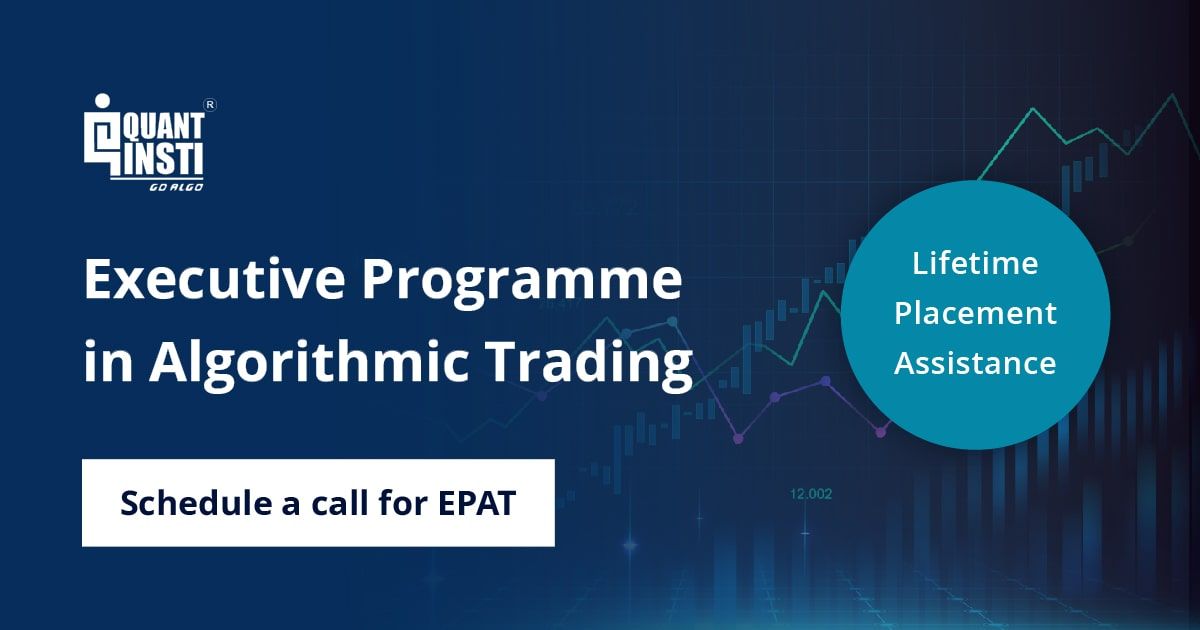Channelling your thoughts and ideas isn’t always easy. Especially when it comes to trading where you give shape to your ideas and bring them to life as strategies.
Raghav Anand is a commerce graduate and had some knowledge of trading prior to entering Trading. He has also done a lot of courses related to trading and technologies. He has earned his way through to the top, and it wasn’t easy.
This is a story worth reading till the end, as Raghav shares all his experiences, learnings, shortcomings and some crucial tips for trading. Raghav Anand is an EPAT alumnus, and we connected with him to share his journey into the world of algorithmic trading with us.
Here’s how our conversation went.
Hi Raghav, kindly tell us about yourself!
Hi! I’m Raghav Anand, and I hail from Ludhiana, Punjab, India. I did my Graduation in Commerce from Narsee Monjee College (NM), Mumbai specializing in the Financial Markets.

I am passionate about playing the guitar, even considering it as a career once. I love to read (I finish up to 3 books in a month) and love travelling, hiking and road trips.
Since my father is a stockbroker with 30 years of experience, I have always had an interest in the Stock Markets. I started trading full time in July 2019, and I have started trading full time since the past one year.
I trade index options on NSE, Back-Nifty and Nifty options. I trade a bit in the stock options, and majorly in index derivatives, mainly options.
How was your journey of Trading?
I credit my achievement to my education in boarding school at Mayo, Ajmer, before Ludhiana. Schooling, College, and the desire to be excellent led me to trade.
While doing my graduation, I wanted to differentiate myself from the common pool. A lot of people did short term trading which inspired me to take it up. I knew I had a portfolio but I had never managed it. I wasn’t confident to go live on my own trading systems and make money.
Trading firms do not hire people without any experience, so getting a job wasn’t an option. My father insisted that I should learn Algorithmic Trading.
I came across a few courses on Algorithmic Trading but all of them were basic and the practical application was missing. That is when one of my friends told me about the EPAT course. The QuantInsti team addressed all my queries, and I took up the course.
After college, I only studied the stock market the whole day for 6-8 months, observing patterns and markets. I implemented my EPAT knowledge by making paper trades, a process, a journal, and a plan.
This landed me a good job at Mansukh Securities, Delhi. I was working at a prop desk, doing market making, trading large volumes, in a good environment with great people who helped me learn prolifically.
After this, I shifted back to Mumbai, to set up a trading desk with few friends. It was just a few months, and then COVID-19 struck.
How has the COVID-19 scenario affected the stock markets and your trading?
This lockdown quarter has been the best quarter of my trading. The systems which I had deployed have given out the best results that they ever could.
When COVID-19 struck, I was stuck in Mumbai for three months. It was a difficult time but my trading is what kept me working and alive.
Since then, I have returned to my home, Ludhiana and have been here. We didn’t go to our offices and I didn’t have my infrastructure at home so deploying all my systems live and trading was not a very sound decision to take. But, I was only trading because I knew all my losses would be under my control.
My father has never seen anything like this in his career, and here I was with only 3-4 years of trading experience. I followed my father’s advice to avoid trading, learn more and focus my approach during these times. This, along with the conviction in my system, helped me stick to it.
January to March 2020 was a pretty rough patch to me but 3-4 days in March was all that I needed to recover my system drawdown.
How did EPAT help you in trading?
I have done most stock-market related courses, but they were subjective. None taught me how to make money from it. They did not talk about quantifying that knowledge.
I need to know how much I can lose on a single trade.
Eg. If you say that I risk X rupees and you end up losing X*100 rupees, I’d freak out. How is it even possible?
The experience at EPAT has been nothing short of an eye-opener. Practical learning has shortened my learning curve by at least 5 years.
I had experience in stock markets but not in the trading segment. I was from a BCom background and had zero experience of coding. I was worried that I would not be able to cope with EPAT.
I was wrong.
The Live online weekend lectures:
- I never thought that I would be able to listen to such lengthy lectures
- It was much work, but it was all presented and compacted in such a nice 6-month course
- The workload never bothered me
- It was only 2 classes a week, almost 3-3.5 hours lectures
- Even if the lectures stretched for 6 hours, I wouldn't mind because it was such good learning
- The people who were teaching us are traders themselves and they have immense knowledge about the subject. So that was also really helpful.
EPAT taught me:
- The approach to taking a system live
- What parameters to consider selecting/rejecting a system
- What to implement and what not to implement in trading
- What works in theory, might not work in practice
- Practical implementation of stock markets, options, implied volatility, option greeks
- Process logic to quantifiable numbers and taking it Live
- Implementation of my ideas
- Execution of my ideas
- Both Excel and Python
- To get better at modelling and designing a strategy
- How to quantify and forward test my strategies
- How to validate my ideas in the market
and so much more...
EPAT changed my way of preparing a plan in trading:
- If I didn’t know how to test my logic and figure out if it was a long term strategy or not, I really can't do anything about it.
- I would have had to forward test it for at least 2-3 years.
- After 2-3 years, I would want to go with the substantial amount deploying it.
- After deploying it, there is no guarantee that I will make money after 3 years of my hard work.
- Imagine, if I get to know that it is not working, then what's the point of that?
- That is how people lose money in trading because they don’t have a sound plan.
How EPAT has changed me:
- I was one of the youngest in my batch. Everyone had traded and I had never punched an order before joining EPAT.
- I could learn from the tremendous experiences of fellow EPATians as well.
- Whatever they or my father used to say that doesn’t work, I used to test it for myself.
- If it fit my trading style and risk parameters, then I would certainly go ahead with every single penny that I had. If it didn’t, then I would not. That is my simple rule.
- That is how EPAT has brought a good change in my life.
Trading psychology is also a very important part for me and also the concepts that are taught in EPAT was a real learning curve for me.
What message do you have for the aspiring traders out there?
Although I’m not as experienced as others traders, I’d like to convey this from my experience:
- Even the best trader in India is not making money every day
- You have to face the fact you are going to face losses
- Being right or wrong in trading doesn’t matter
- What really matters is what you are doing over a period of time
- Have the right approach
- Don’t invest in your strategies without ideating and testing them out
- Have conviction in your ideas and logic
- You cannot make money every day, week or month. There will be outliers.
- Know every detail about your strategy and how it works
- Quantify your strategy to the last possible extent
- Layout a good process and plan
- Have decent goals
- Till the time you are in a small capital, doubling money feels like a piece of cake, but when you are in a big capital it is challenging
- Improve what doesn’t work, try changing it
Don’t take stress:
- Figure out a strategy so that the losses are within your mental drawdown parameters
- Why? So that you don't go into a mental state of unhappiness or depression
- The only reason that people find trading to be stressful is that the risk you're taking is out of your defined parameters
- If you are ready to lose X amount on a daily basis, and your risk is also set to X, then there is no reason to be stressful
- Once you aren't stressful, sticking to your plan becomes easy
- Once you stick to your plan which is working, then there is nothing that can stop you
- Amount of success depends on everybody’s hard work but at least the emotional drawdown won't be there
Planning is critical:
My father has taught me that - The plan and the approach to do something is the most important part rather than the outcome. You only need to take care of the risk. The money will automatically follow.
Stick to your plan, have conviction in it. If your plan is correct, you are on the right path.
Once you achieve that, nobody can stop you from becoming a successful trader or investor or anything. It takes a lot of time and patience, if you have that then there is nothing that can stop you in the stock markets.
Thank you for sharing your journey with us, Raghav. Your journey is replete with a lot of learnings and experiences. These are some really incredible insights which we believe would be extremely helpful to all the learners out there.
We hope you take care and stay safe during this pandemic.
In the quest to learn Algorithmic Trading, you need the right knowledge and necessary skills. The Executive Programme in Algorithmic Trading (EPAT®), helps you achieve your learning goals. EPAT is a comprehensive course covering a wide range of topics.
Disclaimer: In order to assist individuals who are considering pursuing a career in algorithmic and quantitative trading, this case study has been collated based on the personal experiences of a student or alumni from QuantInsti’s EPAT® programme. Case studies are for illustrative purposes only and are not meant to be used for investment purposes. The results achieved post completion of the EPAT® programme may not be uniform for all individuals.

